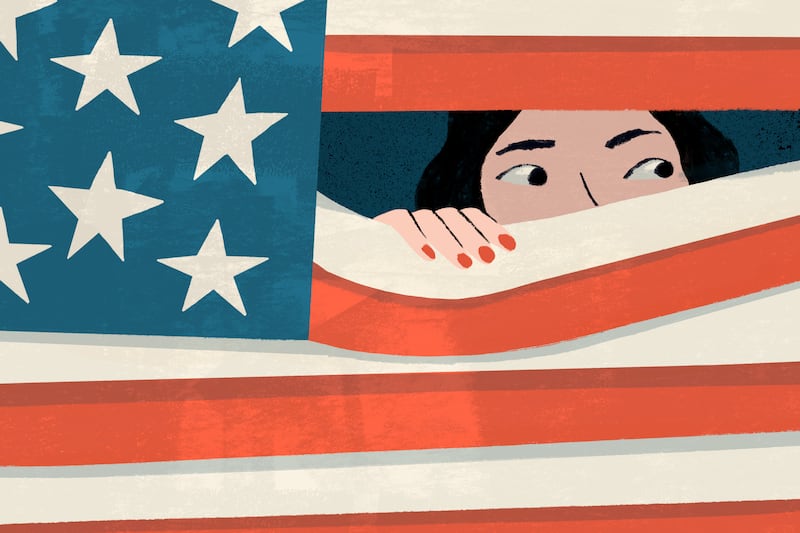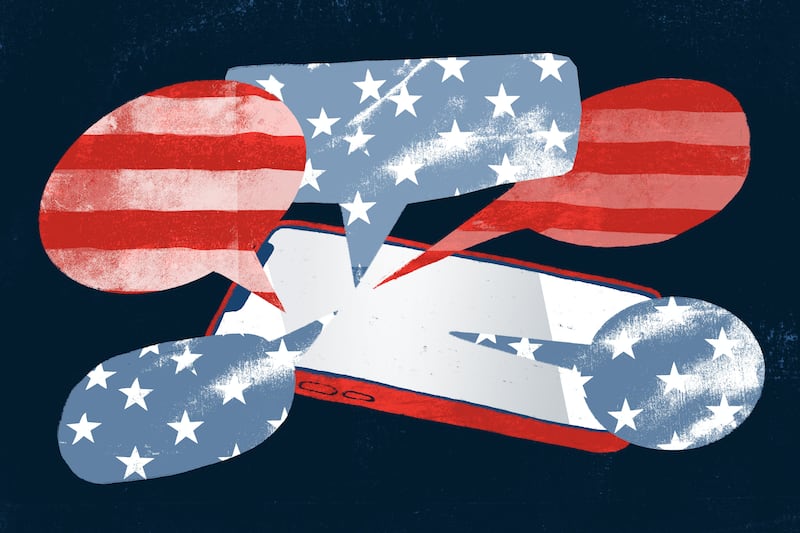Every year, major organizations — including Pew Research Center, Gallup, Edelman Trust Institute and the NORC Center for Public Affairs Research — release their polling information on institutional trust. Gallup’s research was released only a week ago.
What do the numbers say? In a moment of incongruous paradox, one of the few remaining things that unites Americans is our feeling of tribal distrust. Across political, generational and racial lines, Americans have lost faith in many of the systems we once relied on.
Trust has declined in precipitous and historic ways across nearly every sector of public life — Congress, the news, public health, higher education, even religion. If it feels like nobody trusts anything anymore, it’s because, increasingly, we don’t.
The details differ. The distrust is the same.
In one America, the media lies, the elections are rigged, the schools indoctrinate and the government is weaponized. In the other America, the courts are compromised, the police are racist, the churches are corrupt and the rich have rigged the system.
Gallup’s latest report finds that just 28% of Americans have strong confidence in major U.S. institutions — near historic lows.
But the deeper story is polarization: Republicans now report a modest increase to 37% confidence, while Democrats have dropped to 26%, their lowest level ever. Trust now depends less on performance and more on which political party is in power.
Media trust remains abysmal, especially for national outlets. Republicans gained trust in the presidency, military and police, while Democrats lost trust in those same institutions — perhaps especially after recent court rulings and law enforcement controversies.
Arguably, the biggest takeaway has to do with a pillar of trust that has stumbled in recent years: Confidence in the Supreme Court has dropped sharply, particularly among Democrats — just 28% express trust, down from 50% in 2019.
There are silver linings: Trust in higher education has ticked up (44%), and local institutions still fare better than national ones. A few institutions still enjoy broad support: small business (70%), the military (62%) and science (61%).
Overall, Gallup’s report tells a sobering — and fascinating — story. Americans don’t just distrust institutions — they distrust them differently, depending on where they stand politically, socially and geographically.

Institutions as civilizational glue
Yuval Noah Harari says that “institutions are not sexy but they are the bedrock of human society.”
“Individual humans — that’s great — but you can’t build society on that,” he adds. “You must have institutions.”
When trust collapses — when institutions are seen as dishonest, corrupt or incompetent — it weighs every aspect of life down. Every decision becomes slower, riskier and more stressful. We pay more to protect ourselves, to verify information and to decide if someone is reliable.
When institutional trust withers, people aren’t only angry, they are disillusioned — reducing civic participation and weakening moral resolve. Without trust in reliable sources of truth (called epistemic trust) people become manipulable — vulnerable to misinformation and radicalization.
Even our brains take a hit. Laura Silver is an associate director at Pew Research Center who spends time in trust research. “Think about the cognitive burden and the anxiety of constantly having to worry about something like this,” she warns. “It’s like part of your brain is in fight-or-flight mode all the time.”
Fomenting distrust
In a “Freakonomics Radio” episode titled “Why Is American Media So Negative?”, economist Bruce Sacerdote and his co-authors analyzed COVID-19 coverage across multiple outlets and countries. They found that a staggering 87% of U.S. national media coverage in 2020 was negative — and that the negativity persisted no matter the death or recovery rates.
By all means, blame the media for some of this. They deserve some level of opprobrium. But why do more and more media outlets continue to sell such unbalanced narratives? Because we buy them. We humans are both victims and villains in the story of distrust.
I teach economics classes occasionally, and nothing gets students more excited than the old communism/capitalism debate. One semester, a student observed that the greatest flaw in markets is that they mirror our desires. They don’t give us good things, enlightened things or moral things, they give us the things that we want.
So if media markets are giving us more distorted coverage and outrage bait, it has a lot to do with us continuing to be so intent on rewarding them for it with clicks, emotion and interaction.
Why does scandal travel faster and linger longer than ever before? Because we repost on X and share on Instagram. A controversy that once burned out after a week in print now lives indefinitely online — screenshotted, reshared, reframed, meme-ified and rehashed.

Scandal corrodes institutional trust not only because wrongdoing occurs, but because it gets framed as the norm. Social media doesn’t just document institutional failure — it suggests that failure is all there is.
Distrust isn’t always wrong
Sometimes people stop trusting institutions not because they’re cynical but because the institutions haven’t earned their trust. Black Americans, for example, report significantly lower trust in government, higher education, banks and Big Tech. The same is true for many conservatives. Republicans express deep skepticism toward federal agencies, public schools and media outlets. Democrats feel that the Supreme Court is less reliable and the presidency is growing too powerful. While some of that may stem from partisan framing, much of it may also point to real concerns about corruption, bias or institutional overreach.
Researchers find that there are foundational aspects of institutional trust — and a primary one is the simple expectation of competence (can the institution do its job) — along with integrity (does it follow ethical norms) and fairness (does it treat people equally).
When schools fail to educate, when courts fail to be fair, when academics or journalists fail to seek and deliver the undiluted truth, or when public officials fail to deliver on basic responsibilities, skepticism is a rational response.
Culture war collateral damage
Negativity bias, social media and a broken media ecosystem are all part of the problem — but the root may well be the weaponization of political contempt that seems to permeate so many aspects of modern life.
If you can name a culture war, I can name an institutional casualty. The pattern is hard to miss: The more an institution becomes a battleground for political and cultural conflict, the faster public trust in it seems to collapse. The trend shows up everywhere you look.
- Polling from RealClear Opinion Research (2023) found that over 70% of Republicans say they distrust public schools, believing they are “pushing a political agenda.”
- A 2022 Gallup poll found that only 30% of Black Americans had confidence in the police, down from 41% in 2020 — reflecting outrage over high-profile incidents of police brutality.
- That same year, a Pew survey reported that 74% of Republicans believe social media platforms intentionally censor political viewpoints, especially conservative ones.
- Progressives increasingly distrust the Supreme Court, especially after its rulings on abortion and voting rights. In a 2023 Gallup survey, only 28% of Democrats expressed confidence in the Supreme Court — down from 50% just four years earlier.
Again, you are more likely to trust the institutions of America if your person is in the White House — but you are not likely to regain the same level of trust after each political swing.
In each case, institutions that once united us are now seen as ideological battlegrounds.
Restoring trust
This morning, I held my 8-year-old girl’s hand as we crossed the road. Birds were chirping, the sun was rising. As my daughter stepped into the crosswalk. A car stopped. We walked.
I looked over to the neighbors. I’ve given them a key to the house for emergencies. I forget about it most of the time. I’m teaching all of my children about looking both ways before crossing, but all the cars that drive through our neighborhood are careful — many are friends who wave in recognition as they pass. A lot of people like to mock small-town America, but I love it for more than its charm — I love it for its trust.
America used to feel like that — and I think it can again. Researchers say that there’s a path toward more trust, but no one sector can pull it off on their own.
Media will have to focus on the good — and we’ll have to reward them for it. We know journalists don’t live up to the best — but when they do, don’t keep quiet about it. When the courts get it right, make a big deal of it.
That means working against our psychology at times: clicking on the optimistic, and not just the depressing or terrifying.
There are really horrible things out there. But there are also enormous amounts of goodness and beauty in many places — along with many positive intentions even behind the things we are concerned about.
To rebuild trust, our other institutions will have to do their part: more competence, more integrity, more delivering for the little people.
We have our work cut out for us — media, institutions and regular old humans. Rebuilding trust will have to be a common project among all of us.

